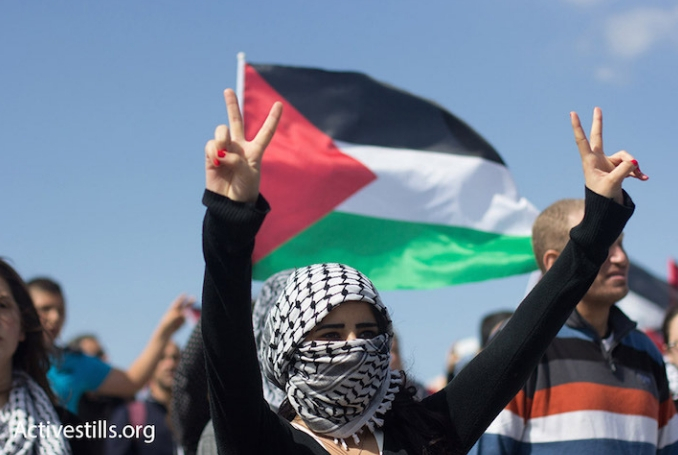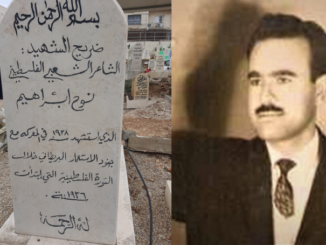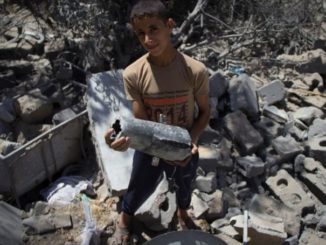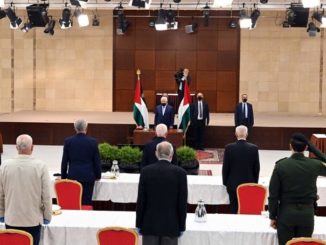
By Benay Blend
In a journal article entitled “Invention, Memory, and Place,” the late Edward W. Said focuses on the question of collective memory: what is remembered, how, and in what form?
According to Said, issues related to nationalism, power, and history are all contested spaces in the ongoing Nakba suffered by Palestinians. The study of history, in particular, conveys how “facts” are taught in schools and universities, institutions that are vital to the Occupied in their quest to preserve Palestinian national identity versus the Official Story promoted by the Zionist state.
A phrase oft-repeated by historians, “he who controls the past controls the power,” bears mentioning because it emphasizes the importance of collective memory. In the case of Palestine, this “recreation of the ‘self,’” as Ramzy Baroud describes it, takes place in the realms of education, journalism, and oral transmission from one generation to the next, to name only a few channels of communication.
“A new articulation of the Palestinian narrative is necessary now more than ever,” Baroud concludes, and this is why, perhaps, Israel has been so intent on targeting schools, journalists, and young people, all vehicles for preserving a sense of collective identity. Greg Shupak emphasizes this point by recording the number of children prosecuted each year in Israel’s military court system (between 500-700); increasing campus invasions by the military police who are intent on disrupting classes; and other forms of violence—all efforts to “direct physical and psychological harm” upon both the victims and their families.
At the core of this logic, Shupak claims, lies the colonizer’s effort to stop the colonized from “develop[ing] independently.” Part of that agenda, he explains, includes preventing young people from attaining an education that would ensure contributing to their nation’s future. More than that, though, there is the desire to undermine the Palestinian story that nevertheless continues to defy Israel’s attempts to erase it.
Lest this focus on Palestinian youth fall into the problem that Nada Elia describes, that of lamenting the deaths of children, at the expense of men, what is at stake here is Israel’s determination to wipe out any history but their own, and they do that by not only attacking students, but also journalists, cultural centers, and any space in which the Palestinian narrative can be passed on. As Elia quite rightly notes, in any struggle, “the emphasis on the ‘innocence’ of women and children is masculinist, and patriarchal, as it strips women of agency, literally infantilizing them as it lists them alongside children, not adult men.”
Indeed, with every death, the Occupier hopes to break the cycle, the passing down of stories from one generation to the next. Thus each individual has intrinsic worth, as Elia notes; all Palestinians have ambitions, some “to be writers, others lawyers,” professions that contribute to what she says is the “dream” of all: “to be free.”
Shupak’s article was posted at about the same time that Israel resumed the intensive bombing of Gaza. On November 14th the Quds News Network reported that Israeli military killed 32 people in Gaza and wounded 111 others, including 6 children along with damage to 15 of their schools. Several theories have been proposed as to why Israel bombed Gaza at this time. Perhaps the best answer comes from Omar Karmi, who said “Why not? Israel bombs Gaza because it can.”
Nevertheless, there is a pattern of ethnic cleansing that is furthered by targeting children along with their educational facilities. As reported by the United Nations, “threats of demolition, clashes on the way to school between students and security forces, teachers stopped at checkpoints, and violent actions of Israeli forces and settlers on some occasions” all have an impact on the children’s right to an education. In 2018, the UN documented 111 different cases of “interference to education” in the West Bank affecting more than 19,000 children. Since that time there have been more, and this report does not include deaths and demolitions in Gaza.
According to Greg Shupak, attacks on education are at the core of settler-colonialism; moreover, these tactics have been used against Indigenous populations throughout time and space. For example, Roxanne Dunbar-Ortiz explains how 1875 marks the beginning of boarding schools for Native children. These institutions were designed to “kill the Indian but save the child,” an unsuccessful effort aimed at separating the children from their collective history. Instead, it produced “multiple generations of lost” Native American youth.
Efforts to erase Indigenous history in the U.S. is ongoing, much like the Nakba continues to this day. In border towns and on Native nations, the onslaught continues, as Native people are murdered through police violence, environmental racism, and the “disappearances” of Native women. Journalists, too, are targeted, as evidenced by the arrests at Standing Rock. In Gaza, too, journalists are targeted, the latest being Muath Amarneh, shot in the eye by an Israeli bullet.
In Chile, too, where Ramona Wadi covered the ongoing struggle of the Mapuche to retain their land, and also Bolivia, where Nick Estes discusses how Evo Morales’ Indigenous socialism became the “standard-bearer” for international Indigenous communities, there has been resistance to settler-colonial violence.
Despite ongoing efforts to erase the Indigenous presence, in Palestine and around the world, the push back will be successful. In The Book of Disappearance (2019), an imaginative recounting of the Nakba that juxtaposes two protagonists, Alaa, a young Palestinian man from Jaffa, and Ariel, an Israeli journalist residing in Tel Aviv, author Ibtisam Azem focuses on opposing views of the catastrophe of 1948. A defining moment for Alaa’s family, it was a time in history that Ariel cannot, or perhaps refuses to, understand. Throughout the book, Alaa records his grandmother’s memories in a red journal that he uses specifically for this purpose, but after a few chapters, we learn about its contents from only Ariel. Alaa, along with all of the other Palestinians, has mysteriously disappeared.
What happened to them is ultimately left up to the reader’s imagination. Did they leave on their own accord, fed up with being strangers in their own land? Were they all Disappeared by the Israeli military, a repeat of the original 1948 event, but this time is taken to the ultimate extreme? A more plausible, and perhaps more satisfying, conclusion is that it doesn’t matter, given that perhaps this time the Palestinians took charge of their own fate, whatever that may be.
As Ariel slowly appropriates his Palestinian friend’s apartment, the red notebook retains its promise that the story will go on. It will remain a narrative told from generation to generation, a history written by Palestinians, not Ariel and his kind. Despite the celebrations that are being planned throughout the country, the Israelis do not win, not as long as there are successive generations of Palestinians to continue writing, recording current events with a camera lens, and telling stories to successive generations yet to come.
– Benay Blend earned her doctorate in American Studies from the University of New Mexico. Her scholarly works include Douglas Vakoch and Sam Mickey, Eds. (2017), “’Neither Homeland Nor Exile are Words’: ‘Situated Knowledge’ in the Works of Palestinian and Native American Writers”. She contributed this article to The Palestine Chronicle.

– Benay Blend earned her doctorate in American Studies from the University of New Mexico. Her scholarly works include Douglas Vakoch and Sam Mickey, Eds. (2017), “’Neither Homeland Nor Exile are Words’: ‘Situated Knowledge’ in the Works of Palestinian and Native American Writers”. She contributed this article to The Palestine Chronicle.







